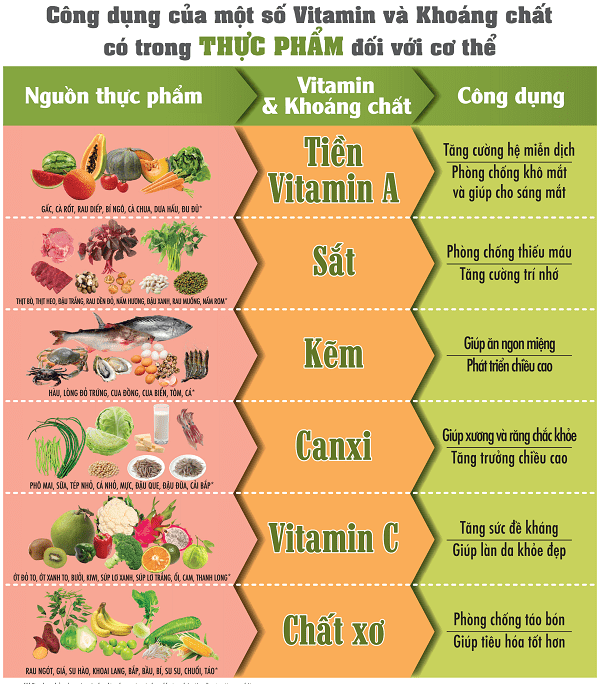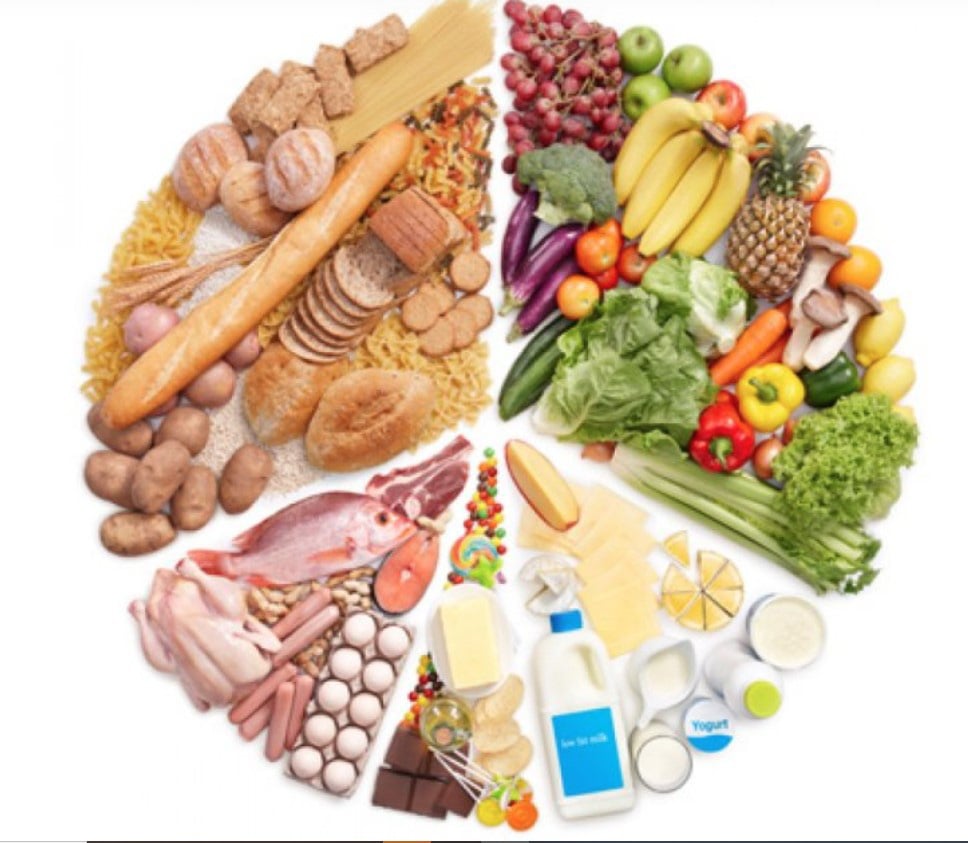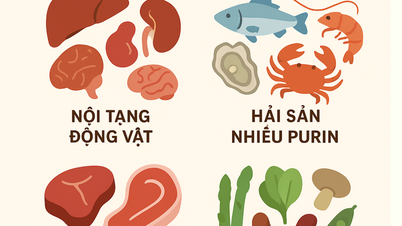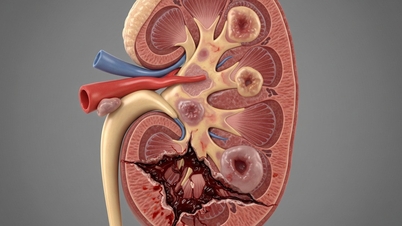Micronutrient deficiency is one of the three nutritional burdens that Vietnam faces. Micronutrient deficiency negatively affects health and overall development. Knowing how to supplement can prevent disease, help the body grow and have good health.

Illustrative table of micronutrient-rich foods and their benefits
Dr. Nguyen Van Tien, National Institute of Nutrition, said Vietnam faces three nutritional burdens: Malnutrition coexisting with micronutrient deficiencies and overweight and obesity, along with an increasing trend of non-communicable diseases.
The reason is that people's diet is still unreasonable (consuming a lot of meat, few vegetables, etc.) and lack of physical activity.
Micronutrient deficiencies are the main causes of limited height, negatively affecting health, physical development, stature, intelligence, hindering comprehensive growth and development, reproductive ability as well as labor productivity...
Doctor Nguyen Xuan Tuan, lecturer at the University of Medicine and Pharmacy, Hanoi National University, said there are many warning signs that the body is lacking nutrients, from simple symptoms such as fatigue, cold hands and feet... to constipation, joint pain, irregular heartbeat...
Calcium deficiency causes numbness and tingling in fingers
According to the National Institutes of Health (NIH), calcium helps strengthen bones and controls muscle and nerve function. Calcium and vitamin D deficiencies can cause osteoporosis. Signs of severe calcium deficiency include numbness in the fingers, tingling, and irregular heartbeat.
Adults need 1,000 mg of calcium a day, women over 50 and men over 70 need 1,200 mg of calcium. Milk, yogurt, cheese, fortified cereals, and dark green leafy vegetables such as kale and broccoli are rich in this micronutrient.
Fatigue and bone pain due to vitamin D deficiency
Vitamin D is important for bone health and may help prevent some cancers. Symptoms of vitamin D deficiency are sometimes vague, but may include fatigue, bone pain, mood changes, muscle aches or weakness.
Prolonged vitamin D deficiency can lead to soft bones, more dangerously, cancer and other autoimmune diseases. The US National Institutes of Health recommends that adults should provide their bodies with 15mcg of vitamin D, and people over 70 years old should get 20mcg of vitamin D per day.
This vitamin is abundant in fortified milk or yogurt, fatty fish such as salmon, mackerel... Sunbathing for 10-30 minutes a day, several times a week also helps increase vitamin D for the body.
Potassium deficiency causes muscle weakness and constipation.
Potassium helps maintain the function of the heart, nerves and muscles, delivers nutrients to cells and removes waste from the body. Along with sodium, potassium also plays a role in balancing blood pressure.
Short-term potassium deficiency can be caused by diarrhea, vomiting, excessive sweating, use of antibiotics, laxatives or diuretics... People with potassium deficiency may have muscle weakness, convulsions or cramps; constipation; tingling and numbness in the limbs; irregular heartbeat or palpitations...
Some natural sources of potassium include bananas, sweet potatoes, avocados, milk, pumpkin, and beans. Adult men need 3,400 mg, while adult women need 2,600 mg of potassium per day.
Vitamin B12 deficiency causes fatigue and swollen tongue
Vitamin B12 supports the production of red blood cells and DNA, and improves nerve conduction function. Vegetarians and vegans are at high risk of deficiency because this vitamin is rare in plants. Symptoms of vitamin B12 deficiency include numbness in the legs, arms, or feet; difficulty maintaining balance; anemia; fatigue; weakness; swollen, inflamed tongue; memory loss...
Adults need about 2.4mcg of vitamin B12 a day from fish, chicken, milk and yogurt. Vegetarians should choose foods rich in this vitamin such as milk, breakfast cereals and multivitamins.

Eat a variety of foods to ensure daily micronutrients - Illustration photo
Iron deficiency causes rapid heartbeat and cold hands and feet.
Iron is needed to make red blood cells, which carry oxygen throughout the body. People at risk of iron deficiency include menstruating women, growing children, pregnant women, and people on a vegan diet.
Iron deficiency can cause weakness, fatigue, shortness of breath, rapid heartbeat, pale skin, headache, cold hands and feet, sore or swollen tongue, brittle nails... Initial symptoms are often mild and difficult to detect, but as iron reserves become depleted, they become more obvious.
Eating fortified cereals, beef, oysters, beans, and spinach helps replenish iron in the body. Men and women over 50 need 8 mg of iron per day, and adult women under 50 need 18 mg per day.
Folate deficiency causes diarrhea and soft tongue.
Folate or folic acid, also known as vitamin B9, is essential for women of childbearing age. Folate supports healthy fetal development and reduces the risk of birth defects involving the neural tube, brain, and spine. People with folate deficiency often experience fatigue, irritability, diarrhea, slow growth, and a soft tongue.
The U.S. Centers for Disease Control and Prevention (CDC) recommends that women of childbearing age get about 400 mcg of folic acid each day. Foods that contain this nutrient include fortified cereals, beans, peanuts, sunflower seeds, eggs, and dark green leafy vegetables.
Magnesium deficiency causes loss of appetite and nausea
Magnesium helps support bone health and energy production. Adults need 310-420 mg of magnesium per day, depending on gender and age. Magnesium deficiency can cause loss of appetite, nausea and vomiting, fatigue, and weakness. In more severe cases, it can also cause numbness, tingling, cramps, muscle spasms, irregular heartbeat, or coronary artery spasms.
Certain medications (antibiotics, diuretics) or health conditions (type 2 diabetes, Crohn's disease) can limit magnesium absorption. To get more of this nutrient, eat more almonds, cashews, peanuts, spinach, black beans, and soybeans.
Lack of B1 causes indigestion and diarrhea.
The body may be lacking vitamin B1 with symptoms: indigestion, diarrhea, poor circulation, anxiety. Foods rich in vitamin B1 are: cereals, wheat, oats, meat, liver, heart.
Vitamin A deficiency causes acne
Vitamin A deficiency can cause acne, pimples on the cheeks, arms and thighs, dry hair, fatigue, insomnia, blurred vision at night, reduced sense of smell and taste, and susceptibility to infection.
Vitamin A is abundant in liver, egg yolks, butter, and cheese. In plants, vitamin A is abundant in dark green or yellow vegetables and red-yellow fruits. You should eat spinach, green cabbage, amaranth, Malabar spinach, pumpkin, mango, gac fruit, carrots, etc.
Vitamin D deficiency causes osteoporosis and tooth decay.
Night sweats and hair loss in children. Vitamin D deficiency causes calcium and phosphorus absorption disorders, which can cause acute or long-term disorders in the bone and teeth system of children as well as rickets, delayed fontanel closure, tooth enamel damage, and osteoporosis in adults.
In particular, a lack of calcium and vitamin D will cause excessive sweating, hair loss, and restless sleep in young children.
Foods rich in vitamin D are found in milk, cod liver oil, egg yolks, avocados, etc.
Lack of B vitamins affects the nervous system
Lack of B vitamins (B6, B9 and B12) can affect the nerve endings under the skin, causing burning sensations, itching and numbness in the extremities. In addition, depression, fatigue, exhaustion, anemia and hormonal imbalances can also cause similar symptoms. Lack of Vitamin B2 can easily cause mouth ulcers, cold sores, fatigue, dry hair...
Foods rich in vitamins include dark green vegetables, milk, meat, fish, and the bran of cereals.
The simple way to prevent malnutrition is to maintain a balanced diet. Daily meals need to be varied, combining many types of food; prioritize choosing and using foods rich in micronutrients and foods fortified with micronutrients; exercise and get proper daily sunlight exposure...
Source: https://tuoitre.vn/dau-hieu-canh-bao-co-the-dang-thieu-vi-chat-can-bo-sung-dinh-duong-kip-thoi-20241030062656785.htm




![[Photo] Prime Minister Pham Minh Chinh chairs the Government's online conference with localities](https://vphoto.vietnam.vn/thumb/1200x675/vietnam/resource/IMAGE/2025/10/5/264793cfb4404c63a701d235ff43e1bd)

![[Photo] Prime Minister Pham Minh Chinh launched a peak emulation campaign to achieve achievements in celebration of the 14th National Party Congress](https://vphoto.vietnam.vn/thumb/1200x675/vietnam/resource/IMAGE/2025/10/5/8869ec5cdbc740f58fbf2ae73f065076)






















































![[VIDEO] Summary of Petrovietnam's 50th Anniversary Ceremony](https://vphoto.vietnam.vn/thumb/402x226/vietnam/resource/IMAGE/2025/10/4/abe133bdb8114793a16d4fe3e5bd0f12)

![[VIDEO] GENERAL SECRETARY TO LAM AWARDS PETROVIETNAM 8 GOLDEN WORDS: "PIONEER - EXCELLENT - SUSTAINABLE - GLOBAL"](https://vphoto.vietnam.vn/thumb/402x226/vietnam/resource/IMAGE/2025/7/23/c2fdb48863e846cfa9fb8e6ea9cf44e7)





































Comment (0)